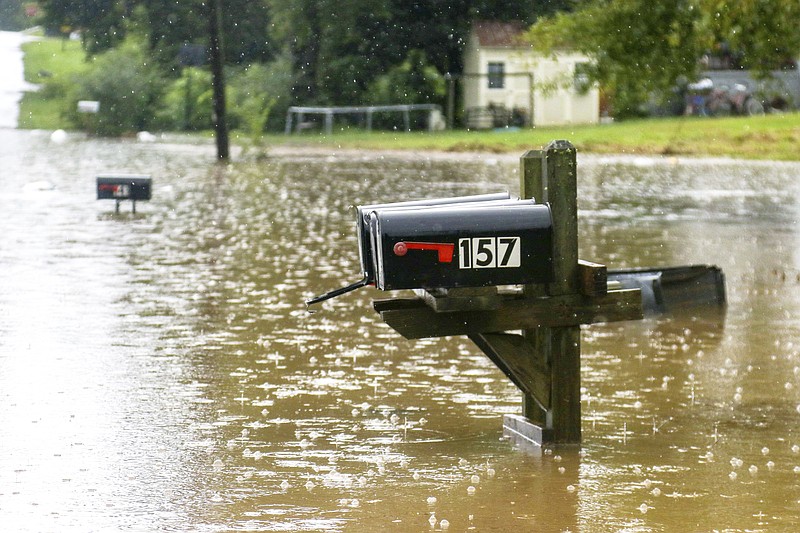Are we ready? If we're not, we'd best be preparing. Last weekend brought torrential rains to much of the South and more was forecast for this weekend.
In Summerville, Georgia, more than 10 inches of rain fell and the Chattooga River rose almost 17 feet, according to the National Weather Service. The deluge flooded the city's drinking water filtration plant, leaving workers scurrying all week to fix the plant and hand out bottled water.
But when a water plant goes down -- or a major pipe breaks as happened in Chattanooga in 2019 leaving some 35,000 Chattanooga businesses and homes dry for several days and under a boil-water alert for several more -- it's not just an occasional drink of water we're left without.
In Summerville, Mohawk Industries -- a flooring manufacturer and one of the largest employers in the Chattooga County -- was forced to pause operations because its runs on city water. Menlo residents and businesses, too, were affected, as were some in Trion and parts of Floyd County and the city of Rome.
Chattooga County is home to about 25,000 people. Floyd has a population of about 97,800. Georgia Gov. Brian Kemp declared both counties in a state of emergency.
As climate change brings more damaging floods to the Southeast and while too many governments and private businesses kick the cans of infrastructure maintenance down the road, resiliency is not a word that slides easily off many tongues.
But we've seen this movie before. And it's not set just in Summerville or Chattanooga.
In Jackson, Mississippi, clean water stopped flowing into homes on Aug. 29 when extreme rain caused the Pearl River to overflow and flooding took out that city's main water treatment plant where pumps had already been failing. Water pressure there was restored on Monday, but residents are still being told to boil their water before using it.
In Chattanooga, the 36-inch main that broke in 2019 was about 20 feet from where crews were working on a planned maintenance project. In late 2021, Tennessee American Water, which operates our plant, told local television reporters it would not release information about the cause of the outage.
In Summerville, however, the cause was clear. City Manager Janice Galloway said stormwater from nearby Raccoon Creek -- the creek where the plant draws its water -- flooded the clear water tanks. Since those tanks are meant to store clean water, they've had to be pumped out and still must be sanitized. An added problem is that workers had to turn off a set of electric pumps before they were submerged by flooding. Officials won't know if those pumps were damaged until they can be fully dried out. Maybe the pumps and clean water tank should have been built higher?
Much of President Joe Biden's Inflation Reduction Act, described as "the most significant legislation in history to tackle the climate crisis," is aimed at our efforts toward resiliency.
But it -- and the planning for it -- must start at home as well as in Washington.
Chattanooga Mayor Tim Kelly, and his predecessors Andy Berke and Ron Littlefield, all named people charged with overseeing resiliency plans for their administrations.
EPB, owned by the city of Chattanooga, years ago while Littlefield was still mayor automated its power grid technology. Now within seconds the "smartgrid" can reroute and restore power to thousands of customers in an outage. Our airport, with its new solar panels, in 2019 under Berke's watch became the first energy-neutral air terminal in the country. Moccasin Bend Wastewater Treatment Plant now provides some of its own pumping power from the sun, as well. Berke told us those efforts translated to taxpayer gains, too, saving about a $1 million a year.
A year into his term of office, Kelly has even taken the resiliency effort to local yards, asking Chattanooga residents to make their yards "RainSmart" to prevent runoff residents' property from winding up in the city's overburdened stormwater system. Chattanoogans are competing with Knox county residents in the NoogaKnox challenge, and local residents have a money incentive to save up to 75% on their annual water quality fee as part of the RainSmart Yards certification program.
This may sound like a little drop in the bucket compared to losing the clean water that flows into your home, but clean water doesn't happen magically or cheaply. When our stormsewers overflow, river water costs more to treat.
The city has spent hundreds of millions and will spend hundreds of millions more to retrofit our outdated stormwater and sewer system as part of a 20-year consent decree with the U.S. Environmental Protection Agency and the Tennessee Department of Environment and Conservation. Why? Because for years our stormwater runoff has consistently caused the sewage treatment system to contaminate the Tennessee River and the streams that flow to it.
And let's face it -- stormwater runs from every yard in our region to a sewer or street or stream. How much more local can resiliency get?
"For Mayor Kelly, resiliency is kind of the table stakes," said Ellis Smith, Kelly's director of special projects. Smith says Kelly has a saying: If people can't trust us with streets and sewers, how can they trust us with anything else.
Well, we have to trust ourselves, too. In our yards, our homes, our cars. All the fixes can't come from disaster funds after the floods and pipe ruptures. Nor will they all come from the Biden administration infrastructure and climate legislation.
Like it or not -- as in politics and climate change, all resiliency is local.
